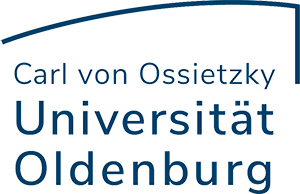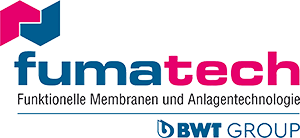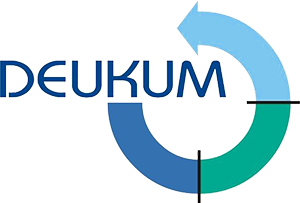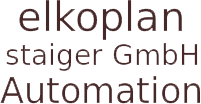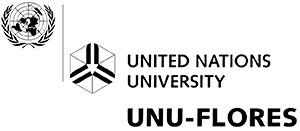placeholder_press
25/07/2024
TU Dresden tests pioneering technology at the "Blockhaus" waterworks in LiebenauNienburg/Liebenau. The Technical University of Dresden is developing a water desalination process under the leadership of Professor Dr André Lerch. The speciality: In contrast to "classic" desalination plants, only the ions that need to be removed are retained in an electrochemical process. The potential of the technology is estimated to be correspondingly high. One of the TU's partners is the District Association for Water Management.The Kreisverband für Wasserwirtschaft and TU Dresden have already carried out a number of projects together in the past, for example on energy optimisation in the field of municipal water supply. "Research and practice work well together in our case," emphasises Joachim Oltmann, Head of the Drinking Water Supply Department at the district association. "We are delighted to be able to support the TU again this time."When the term "desalination" is mentioned, the layman primarily thinks of seawater desalination plants, such as those used in Saudi Arabia. But that is not the point, emphasised project manager Professor Dr.-Ing. Lerch on site at the "Blockhaus" waterworks: "In the known processes, all salts are first removed. Afterwards, they have to be added back in parts with some effort so that the water remains usable or drinkable. In contrast, the core of our process is to change the composition of the water as little as possible. We only remove the salts that need to be removed in different application scenarios."While nitrates from agriculture are removed from the water at the "Blockhaus" waterworks, a second pilot plant on Langeoog deals with sodium and chloride, which enter the island's groundwater via the seawater. Targeted transport is possible using specially adapted membranes.The new technology could solve many problems, but is not available for free: Hanna Rosentreter, research assistant at the Faculty of Environmental Sciences at TU Dresden, estimates the energy requirement at around 0.1 kilowatt hours per cubic metre of water to be treated. However, it is not a question of operating a plant on a large industrial scale at the Liebenau waterworks: "The water here is fine," emphasises Rosentreter. "Specialised desalination is not necessary."Water expert Joachim Oltmann agrees: "Quite apart from our technical facilities for water treatment, we have been committed to groundwater protection together with the agricultural sector for many years." The system running in the "Blockhaus" is merely intended to confirm in practice what has worked well in the laboratory so far. According to Hanna Rosentreter, the pilot project, which will run until August, will provide a basis for making concrete statements about the performance and costs of a large-scale industrial plant that could be used in areas where the salt load in drinking water is too high."For us water suppliers," Joachim Oltmann summarises the on-site visit, "it's about expanding our options for action. We don't know what the future holds and how the salt loads in drinking water will develop as a result of climate change. So it's good to have a practical solution up our sleeve." DIE HARKE (DH)
01/07/2021
OOWV practical partner in nationwide research project Extracting salts from water - and enriching groundwater Langeoog/In Nord west. Falling groundwater levels and increasing salinization of groundwater are challenges of the present and consequences of climate change. Solutions are the focus of a nationwide research project with the participation of the Oldenburg-Ostfriesischer Wasserverband (OOWV) under the leadership of the Technical University of Dresden. Therefore, a pilot plant will be installed in the Langeoog waterwork for eight months from the end of 2022. In particular, it will remove sodium and chloride from the groundwater near the coast in order to subsequently infiltrate it again for the purpose of groundwater recharge. The aim is to develop special membranes for this process, through which the water can be purified accordingly. "It won't be of drinking water quality afterwards," reports Yannick Tiemann, project manager on the OOWV side, "but it can be fed into the groundwater body afterwards." It is also conceivable that the treated water could be used for industrial purposes, thus conserving drinking water resources. There is still a long way to go before the first concrete results are available - the research project entitled "innovatION" is at its beginning. Initial results are expected in 2024. The project is funded by the German Federal Ministry of Education and Research. "During the eight-month pilot phase at the Langeoog waterwork, we will be responsible for supervising the plant and taking samples of different waters - meaning groundwater, process water and water from the pilot plant. We share the samples and the results obtained from them with the project partners for laboratory tests," describes Yannick Tiemann. "Due to the globally increasing demand for water and the decreasing availability of freshwater resources, there is a worldwide interest in efficient desalination processes," states the "innovatION" project description of the TU Dresden. "We are pleased to be one of the two practical partners, along with the Kreisverband für Wasserwirtschaft Nienburg," says the OOWV project manager.He has also already been involved in "MULTI-ReUse," a water reuse process in which treated wastewater is further processed to make it available to local industry. Here, the plans for a large-scale plant with its own supply network in Nordenham are concrete. The plant will save around one million cubic meters of drinking water per year. After all, not every industrial process requires the valuable water in drinking water quality.
22/03/2021
Research project develops sustainable, membrane-based water desalination processDue to the globally increasing demand for water and the decreasing availability of freshwater resources, there is a worldwide interest in efficient desalination processes. Freshwater that is influenced by the sea or by geogenic, i.e. natural, underground salt deposits often has high concentrations of sodium and chloride. High nitrate and sulphate concentrations usually result from agricultural influence. "Conventional desalination processes desalinate water completely and usually do not distinguish which salts are retained," explains Prof. Dr.-Ing. André Lerch, professor of the chair of process engineering in hydrosystems and coordinator of the innovatION joint project. "However, a complete desalination of the waters is often not useful, but only a reduction of the monovalent, singly charged ions."The aim of the innovatION research project is to develop an energy-efficient selective membrane-based desalination process for the targeted removal of monovalent ions from saline groundwater and surface water, and to examine potential applications and areas of use, taking into account water chemistry, economic and ecological aspects.innovatION stands for Selective Removal of Monovalent Ions from Saline Waters for Groundwater Recharge and Drinking Water Treatment. The joint project will be funded over the next three years by the Federal Ministry of Education and Research BMBF within the funding measure "Water Technologies: Water Reuse". innovatION brings together nine national partners from practice and science as well as two international associated partners. Within the framework of innovatION, selective membranes for specific retention of monovalent salts are being developed and installed in newly designed modules for use in an electrochemical process in laboratory and pilot plants. The plants will be used to carry out investigations to identify optimised process and plant parameters depending on different raw water qualities and treatment targets. The resulting effects and challenges for the different raw waters will be examined. The developed technology will be compared with international targets such as the sustainability goals using a holistic economic-ecological sustainability assessment in order to derive recommendations for action.By choosing partners from industry, science and practice, the consortium is able to build plants and test and evaluate the innovative technology on site with practical partners. Young scientists can be involved in cooperation and exchange with international scientists at an early stage. The results thus contribute significantly to securing water resources and further education, both nationally and internationally.
placeholder_publications_alt
12/09/2024
We are excited to share that the results of innovatION were represented in September 2024 at the EuroMembrane 2024 conference in Prague. It was a fantastic opportunity to present the results, exchange ideas, and engage with leading experts in the field. Our BMBF funded project innovatION was represented by Tim Oddoy, Jochen Meier-Haack, David Schödel and Hanna Rosentreter, showcasing advancements in the production of selective ion exchange membranes, flow modeling, and the selective removal of nitrate and chloride with the mMCDI.
04/09/2024
In cooperation with the joint projects WEISS_4.0, RIKovery and innovatION, a fact sheet on the WavE cross-sectional topic “TECHNOLOGIES AND PROCESSES” was created with DECHEMA. This can be downloaded in the appendix. The different capacitive processes of the WavE joint projects are presented here.
30/05/2024
At the annual conference of the BDEW/DVGW regional group of Central Germany, Prof. Dr.-Ing. André Lerch presented the results of innovatION in Halle in a lecture entitled "Selective treatment of groundwater to reduce sodium chloride and nitrate". Around 180 participants from the energy and water industry took part in the event on May 29 and 30 and discussed energy and water policy issues at the Leopoldina National Academy.
16/05/2024
IFAT is one of the world's largest trade fairs for water, wastewater, waste and raw materials management. At the event "Water technologies for water reuse - Innovation Forum Block 2" at IFAT in Munich, Prof. Dr.-Ing. André Lerch presented the "Selective removal of monovalent ions from saline waters for groundwater recharge and drinking water treatment" of the innovatION joint project in a presentation. Afterwards, the results and other presentations of the WavE funding initiative were discussed with DECHEMA and the expert audience.
26/10/2023
The project innovatION was presented at the "15th Aachener Tagung Wassertechnologie - ATW" with two lectures on laboratory results as well as on flow and process modeling with selective desalination. Hanna Rosentreter presented selective desalination as a function of various process and material parameters. With the help of suitable process settings and the novel selective membranes, desalination can thus be carried out preferentially for monovalent ions. David Schödel presented the tracer experiments to validate the flow model and discussed the model approaches for process modeling. Project partners from elkoplan Staiger GmbH and the Oldenburgisch-Ostfriesischer Wasserverband were also represented at the AWT. The AWT was a suitable platform for discussing the results of selective desalination and modeling with national scientists and users.
08/09/2023
Presentation of the experimental results of the UOL at the Goldschmidt Conference (Lyon) and the German Soil Science Conference (Halle) At this year's international geochemical conference Goldschmidt from 09.07. - 14.07.2023 in Lyon, Laura Bräunig presented the results obtained by means of column experiments on the mobilization of arsenic during the infiltration of a monovalent partially desalinated water in the form of a poster. The lively exchange during the poster session showed clear international interest in this targeted and more energy-efficient desalination process. The temporary reduction of arsenic transport under the influence of the ionic strength and the chemical composition of the infiltration water showed a clear advantage for the use of monovalent partially desalinated water for potential artificial groundwater recharge. The network with international scientists working on similar studies was also expanded, leading to a better understanding of the process. More information can be found here: https://conf.goldschmidt.info/goldschmidt/2023/meetingapp.cgi/Paper/20529 The participation and a presentation by Laura Bräunig at the German Soil Science Conference in Halle from 02.09. - 08.09.2023 achieved a better understanding of the dune development and properties of the sands of the potential recharge site Langeoog, which have an impact on the geochemical reactions during artificial groundwater recharge. Interest in the approach of combining desalination and artificial groundwater recharge to ensure groundwater quality and quantity in Germany also became clear.
26/07/2023
From July 23th – 26th the 10th “International Water Association Membrane Technology Conference & Exhibition for Water and Wastewater Treatment and Reuse” (IWA-MTC) was held in St. Louis, USA. Hanna Rosentreter presented the desalination results of the laboratory tests from the innovatION joint project. By combining nanofiltration membranes and standard ion exchange membranes as well as selective ion exchange membranes fabricated by the project partners themselves, the capacitive deionisation experiments at the TUD Dresden University of Technology showed a up to 14 times higher retention of monovalent ions compared to the retention of divalent ions. The comparison with international studies at the conference shows that selective desalination is gaining attention for a sustainable future, especially regarding energy consumption and resource consumption. Due to the high retention of nitrate and chloride compared to the hardly existing retention of sulfate, very high selectivity values can be measured within the innovatION project compared to other studies. The abstract of the presentation can be found here:
29/06/2023
From June 26th – 29th, the 13th European Symposium on Electrochemical Engineering ("ESEE") was held in Toulouse, France. The research areas represented range from energy storage and resource recovery to hydrogen and desalination technologies and fundamental electrochemical mechanisms at the nanoscale. In the session on electrochemical separation technology, the innovatION project was represented as a desalination technology. In his presentation, David Schödel outlined the methodology of the project-accompanying modelling and discovered outcomes, as well as some results from the laboratory experiments, which raise new questions for the modelling. In the subsequent discussion, interest was directed towards the principle of mMCDI and the membranes used, and other participants shared interesting experiences from their own projects in upscaling electrochemical desalination processes. An abstract of the presentation can be found as download:
23/04/2023
At this year's European Geosciences Union Conference in Vienna from 23 - 28 April 2023, the University of Oldenburg presented its research results to date in the innovatION project on the experimental and modeled geochemical reactions during potential groundwater recharge with a monovalent partially desalinated water using the East Frisian island of Langeoog as a case. In the form of a presentation in the session "Sustainable Groundwater Management in Water Stressed Regions" and a poster in the session "Integrating understanding across the land-ocean continuum: multidisciplinary approaches to studying saltwater intrusion and submarine groundwater discharge" the research project and its importance could be clarified, the network could be extended, and suggestions and feedback on the previous work could be obtained. Further information on the presented content can be found here: https://doi.org/10.5194/egusphere-egu23-15634 https://doi.org/10.5194/egusphere-egu23-1392
24/11/2022
The Aachen Membrane Colloquium (AMK) traditionally takes place every 2 years. This year we were able to present our first interim results from the innovatION project on ion exchange membranes with a poster as well as in a pitch. At the AMK, in addition to membrane manufacturing methods, results on the use of membranes for water treatment and desalination were presented. Electrochemical membrane processes are becoming more and more important for desalination as well as for the recovery of valuable resources. The AMK is a suitable exchange platform for manufacturers, researchers and operators. We hope to be present again next year in Aachen - at the 15th Aachen Conference on Water Technology, which will take place alternately to the AMK - to present the latest results of innovatION.
24/11/2022
Euromembrane is organised by the European Membrane Society (www.emsoc.eu) every three years (2021 Copenhagen; 2024 Prague (https://euromembrane2024.cz/)) and is one of the largest membrane conferences in Europe. It primarily serves the exchange of knowledge between scientists. This year's Euromembrane was a special edition on the occasion of the 40th anniversary of the European Membrane Society. The Euromembrane programme was very broad and covered many topics in the membrane sector, with membrane-based desalination methods being one of the focal points. First results on membrane development from the joint project innovatION could be presented in the form of a lecture.
21/09/2022
On this years MELPRO conference, the latest findings on the membranes and electrochemical processes have been discussed. After the last conference in 2020, which had to be organized as an online event, the participants from science and industry could meet in Prague to discuss recent research and development at presentations, posters and panel discussions. Also the goals and progress of the project innovatION, as well as the current state of the modelling have been presented by David Schödel.
12/05/2022
At POP-UP-WISSEN - Wissen schafft Dialog, a project of the Technical University of Dresden, innovatION was also presented on a poster in order to exchange information with the public and to answer questions on this topic. The aim of the project is, through POP-UP-WISSENsläden, decentralized events at POP-UP-WISSENsorten and virtual activities in the POP-UP-WISSENsnetz, to arouse the curiosity of the population in Weißwasser and Dresden, to answer questions and discover future topics. Further information on the "Wissenschaftsjahr 2022 Nachgefragt!" and "POP-UP-WISSEN - Wissen schafft Dialog"campaign is available here: https://www.wissenschaftsjahr.de/2022/ https://tu-dresden.de/kooperation/wissenschaftsjahr-2022
01/04/2022
From 16 to 18 of March the annual conference of "ProcessNet Fachgruppen Computational Fluid Dynamics, Mischvorgänge und Agglomerations- und Schüttguttechnik", which is organized with the DECHEMA, took place in Leipzig. Besides talks and presentations from attendees regarding fundamental science or industrial scale applications, the innovatION project was also represented by David Schödel. For the "Computational Fluid Dynamics" group a poster from a prior Master Thesis, describing the approaches to our mMCDI model was presented and discussed.
25/03/2022
From March 23rd to March 25th 2022, the conference of the Fachsektion Hydrogeologie e. V. of the DGGV (Deutsche Geologische Gesellschaft – Geologische Vereinigung) took place online, with the main topic "Groundwater - Climate - Society", in cooperation with the Friedrich Schiller Universität Jena. In the session "Artificial and natural groundwater reacharge" the PhD student Laura Bräunig and the Master student Mareike Schloo, Carl-von-Ossietzky Universität Oldenburg, could present their first results from the project "innovatION" on the geochemical interactions during the infiltration of a monovalent-partially desalinated water into dune sediments of the East Frisian island Langeoog in two posters and flash talks. Likewise, the meeting showed the increasing interest in research on methods and techniques for groundwater protection and understanding of groundwater quality, as well as processes during infiltration through the vadose zone. This reinforces the motivation of the "innovatION" project for the development of a monovalent-selective membrane and the importance of understanding geochemical reactions during artificial groundwater recharge with product water.
07/07/2021
innovatION is a joint project which is focused on the development of a sustainable treatment and utilization of saline groundwater of the WavE-Network (https://bmbf-wave.de) of the Federal Ministry of Education and Research.In July 2021 all WavE-Partners came together for a launch event. The goal and content of innovatION were presented with the following three posters.
07/07/2021
innovatION is a joint project which is focused on the development of a sustainable treatment and utilization of saline groundwater of the WavE-Network (https://bmbf-wave.de) of the Federal Ministry of Education and Research.In July 2021 all WavE-Partners came together for the WavE kick-off event. Hereby, Prof. Dr.-Ing. André Lerch presented the contents and goals of innovatION.

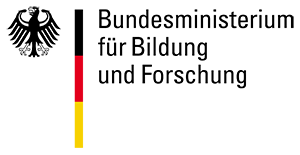
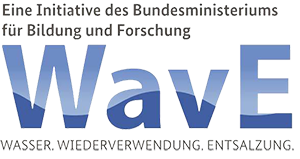

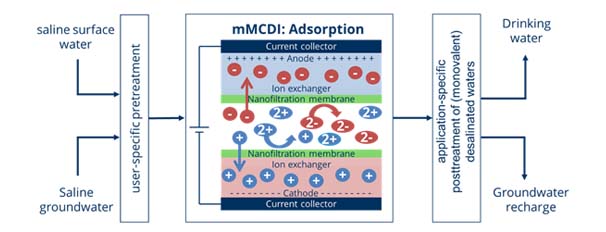 References:
References:


